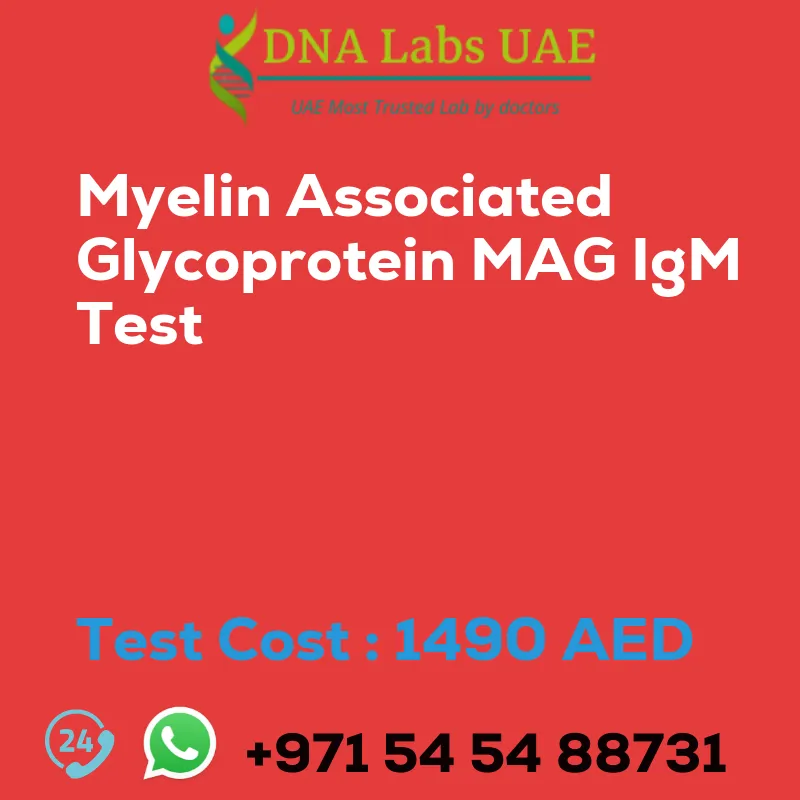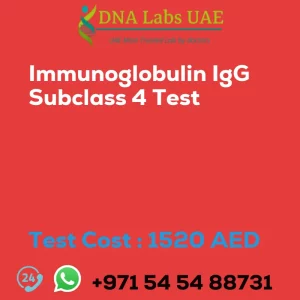MYELIN ASSOCIATED GLYCOPROTEIN MAG IgM Test
At DNA Labs UAE, we offer the MYELIN ASSOCIATED GLYCOPROTEIN (MAG) IgM test to detect the presence of IgM antibodies against the myelin-associated glycoprotein (MAG) in the blood. This diagnostic test helps in identifying autoimmune conditions such as anti-MAG neuropathy.
Test Details
The MYELIN ASSOCIATED GLYCOPROTEIN (MAG) IgM test is a diagnostic test used to detect the presence of IgM antibodies against the myelin-associated glycoprotein (MAG) in the blood. MAG is a protein found in the myelin sheath, which is the protective covering around nerve fibers.
Symptoms and Diagnosis
Elevated levels of MAG IgM antibodies can indicate an autoimmune condition called anti-MAG neuropathy. This condition is characterized by damage to the peripheral nerves, leading to symptoms such as weakness, numbness, and tingling in the extremities. Anti-MAG neuropathy is often associated with conditions like monoclonal gammopathy of undetermined significance (MGUS) or Waldenstrm macroglobulinemia.
The MAG IgM test is typically ordered when a healthcare provider suspects anti-MAG neuropathy based on a patient’s symptoms and clinical history. It can help confirm the diagnosis and guide treatment decisions.
Test Components and Price
The MYELIN ASSOCIATED GLYCOPROTEIN MAG IgM Test costs AED 1490.0. The test requires a sample of 2 mL (1 mL min.) serum from 1 SST, which should be shipped refrigerated or frozen. Duly filled Test Send Out Consent Form is mandatory for the test.
Report Delivery
The sample for the MYELIN ASSOCIATED GLYCOPROTEIN MAG IgM Test should be sent by the 7th of the month, and the report will be delivered after 2-3 weeks.
Method and Test Type
The MYELIN ASSOCIATED GLYCOPROTEIN MAG IgM Test is performed using the EIA method. It is categorized under autoimmune disorders and disorders of the central nervous system.
Doctor and Test Department
The MYELIN ASSOCIATED GLYCOPROTEIN MAG IgM Test is typically ordered by a Neurologist. The test is conducted in the OS (Outpatient Services) Test Department.
Pre Test Information
Duly filled Test Send Out Consent Form is mandatory for the MYELIN ASSOCIATED GLYCOPROTEIN MAG IgM Test.
Treatment and Conclusion
Treatment for anti-MAG neuropathy usually involves managing the underlying condition, such as MGUS or Waldenstrm macroglobulinemia, and providing supportive care to alleviate symptoms. It is important to note that the MAG IgM test is just one component of the diagnostic process, and a healthcare provider will consider other clinical factors when interpreting the results.
| Test Name | MYELIN ASSOCIATED GLYCOPROTEIN MAG IgM Test |
|---|---|
| Components | |
| Price | 1490.0 AED |
| Sample Condition | 2 mL (1 mL min.) serum from 1 SST. Ship refrigerated or frozen.Duly filled Test Send Out Consent Formis mandatory. |
| Report Delivery | Sample by 7th of the month; Report after 2??3 weeks |
| Method | EIA |
| Test type | Autoimmune disorders, Disorders of Central Nervous System |
| Doctor | Neurologist |
| Test Department: | OS |
| Pre Test Information | Duly filled Test Send Out Consent Formis mandatory. |
| Test Details |
The MYELIN ASSOCIATED GLYCOPROTEIN (MAG) IgM test is a diagnostic test used to detect the presence of IgM antibodies against the myelin-associated glycoprotein (MAG) in the blood. MAG is a protein found in the myelin sheath, which is the protective covering around nerve fibers. Elevated levels of MAG IgM antibodies can indicate an autoimmune condition called anti-MAG neuropathy. This condition is characterized by damage to the peripheral nerves, leading to symptoms such as weakness, numbness, and tingling in the extremities. Anti-MAG neuropathy is often associated with conditions like monoclonal gammopathy of undetermined significance (MGUS) or Waldenstrm macroglobulinemia. The MAG IgM test is typically ordered when a healthcare provider suspects anti-MAG neuropathy based on a patient’s symptoms and clinical history. It can help confirm the diagnosis and guide treatment decisions. Treatment for anti-MAG neuropathy usually involves managing the underlying condition, such as MGUS or Waldenstrm macroglobulinemia, and providing supportive care to alleviate symptoms. It is important to note that the MAG IgM test is just one component of the diagnostic process, and a healthcare provider will consider other clinical factors when interpreting the results. |








